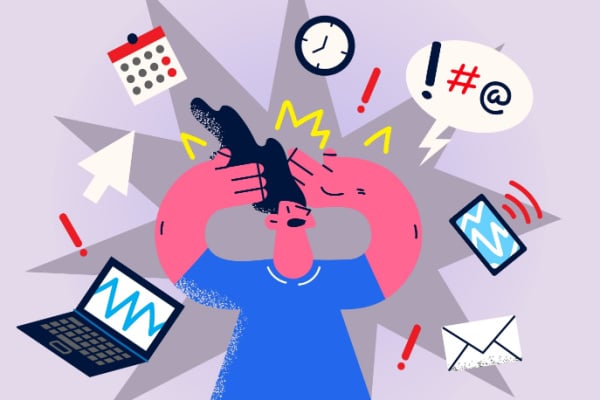Should you always have work notifications switched on?
Written by CMI Insights Wednesday 12 July 2023
Want to skip straight to the results and what they mean for managers? Click here.
In our age of remote working, replying to work messages and keeping colleagues up to date digitally is key to staying connected to our team. Due to a decline in the frequency of watercooler moments within the office environment, a quick Teams message or email has instead become our go-to for cultivating and nurturing our work relationships during work hours.
But does this digital availability do us more harm than good? And is it holding back our progress at work, rather than assisting it?
The science of the matter
None of us are alien to the familiar sound of an incoming message on our laptops or the ping of an email landing in our inbox. In fact, a 2023 study by Forbes Advisor found that workers are spending an average of 20 hours a week using digital communication tools – half of our average working week. Surely, this must be having an impact on our brains?
As Dr Sanam Hafeez PsyD explains, receiving a notification, or even anticipating one, triggers a physical reaction, shutting off the prefrontal cortex (the bit of our brain that regulates higher-level thinking) and instead activates the amygdala (the area associated with emotions and the fight-or-flight response). This then sends emergency signals around the body.
Say you’re in the middle of working on a big project and you receive a notification. You lose focus on the task at hand and instead open it to respond. As this happens, you receive a big pump of stress hormones, priming your body to face a non-existent threat. Constant notifications can be overwhelming and even trigger feelings of anxiety.
“It sends our brain into overdrive, triggering anxiety and stress, and at the very least, hypervigilance, which is meant to protect ourselves from predators, not the phone,” continues Dr Sanam.
If you’re no stranger to the Sunday Scaries fear of opening up your emails on a Monday morning, this might be why…
Plus, once you’ve looked at one message, it can then be tempting to look at another – a snowball effect which can lead us to forget what we were even looking at in the first place. It's not surprising, then, that we see an estimated 40% drop in our productivity levels when a message comes in. In fact, Asana reports that workers are spending almost 60% of the day on “menial tasks” or “work about work”, such as dealing with our inboxes.
Want to learn more about how to strike a healthy balance with your notifications?
Register for Free Access
Not yet a Member, Subscriber or Friend? Register as a CMI Friend for free, and get access to this and many other exclusive resources, as well as weekly updates straight to your inbox.
You have successfully registered
As a CMI Friend, you now have access to whole range of CMI Friendship benefits.
Please login to the left to confirm your registration and access the article.
Article
Our extensive range of articles are designed to keep you in the loop with all the latest management and leadership best practice, research and news.
Members See More
CMI Members have access to thousands of online learning and CPD resources. Learn more about our membership benefits
Join The Community
CMI offers a variety of flexible membership solutions, tailored to your needs. Find out more and get involved in the CMI community today.
